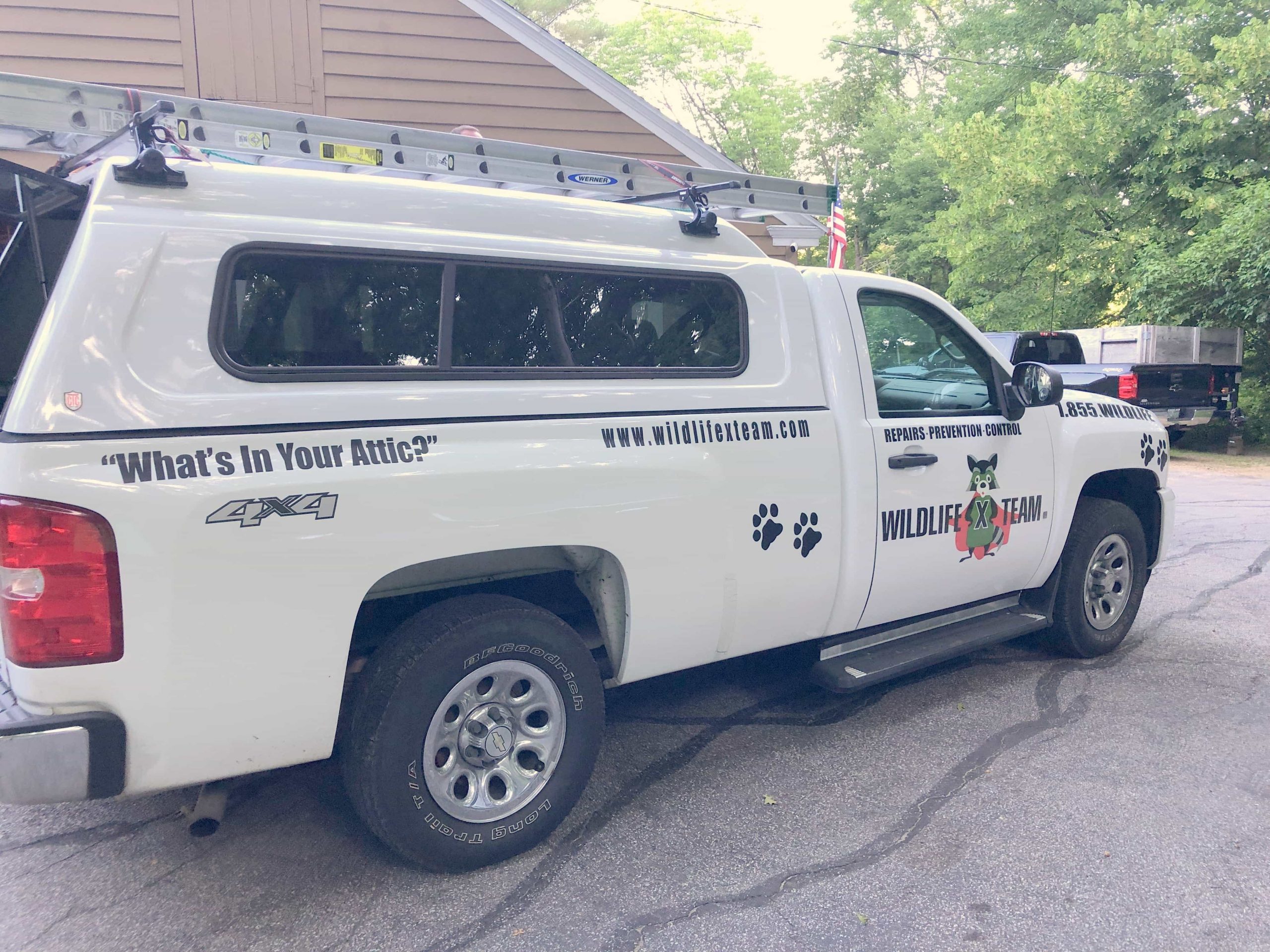Wildlife Removal New Hampshire

Call for Your Exclusive Wildlife Inspection Report.®
BIRD REMOVAL
Birds are interesting creatures and have fun habits that give people joy and satisfaction. However, this is not always the case, as birds can also be destructive and annoying. For example, pigeons and seagulls deface buildings and lawns with their poop, woodpeckers destroy structures, and other bird species wreak unique havocs.
The bird population in urban areas is continually on the rise, and so is the danger they bring along. To a large extent, wild birds are carriers of disease pathogens that can infect humans and animals. This makes them a public health risk.
HOW TO REMOVE BIRD PESTS FROM YOUR HOME AND YARD
Bird pests are dangerous to you and your pet animals, and so you should get rid of them as soon as you discover an infestation. You can achieve both bird removal and exclusion by using the following methods:
- USE OF BIRD TRAPS: One-way traps are the best for trapping birds. Search for entry holes and seal all except one, then set your trap at the hole entrance and keep checking and removing any trapped bird. The birds often stay in the attic, so you may have to climb up to the attic to get all the birds. Wildlife X Team New Hampshire has professionals with excellent skills to tackle bird removal, and with just a call, we can offer you the best services.
- USE NATURAL PREDATORS: Using natural predators is a great method of ridding yourself of a bird pest infestation. To do this, you introduce a bird that the bird pest considers to be a natural enemy, and its presence in your home will dissuade bird pests from setting up camp in your space. This method is environmentally friendly and very humane, it does not involve chemical use, and after eviction, you can remove the predators. The predator does not kill the bird pests but scares them away from your yard.
- USE OF ANTI-PERCH SPIKES
Anti-perch spikes are a simple method that is humane and effective in bird removal from your building. You arrange the spikes on roofs, flat surfaces, ledges, and other areas where birds perch. The spikes prevent the birds from roosting on the rooftops and walls of your home and hence, prevent bird infestations.
- USE OF PROTECTIVE NETS: You can also fix nets on all holes in your home like the vent and chimney. The nets will help to prevent a bird infestation and keep your home free of bird pests. Bird nets are available in varying sizes, and you can get the most appropriate one to use on your structures. You can also get the net in various colors that will match the color of your house. Fix these nets tightly, so that the birds bounce off when they perch on the roof.
Wildlife X Team New Hampshire offers professional services in bird removal and relocation, damage repair and exclusion, fumigation, and cleaning of the litter that the birds leave behind, including food debris, fecal matter, and urine. You can call us for professional help if you get stuck. We would love to hear from you.
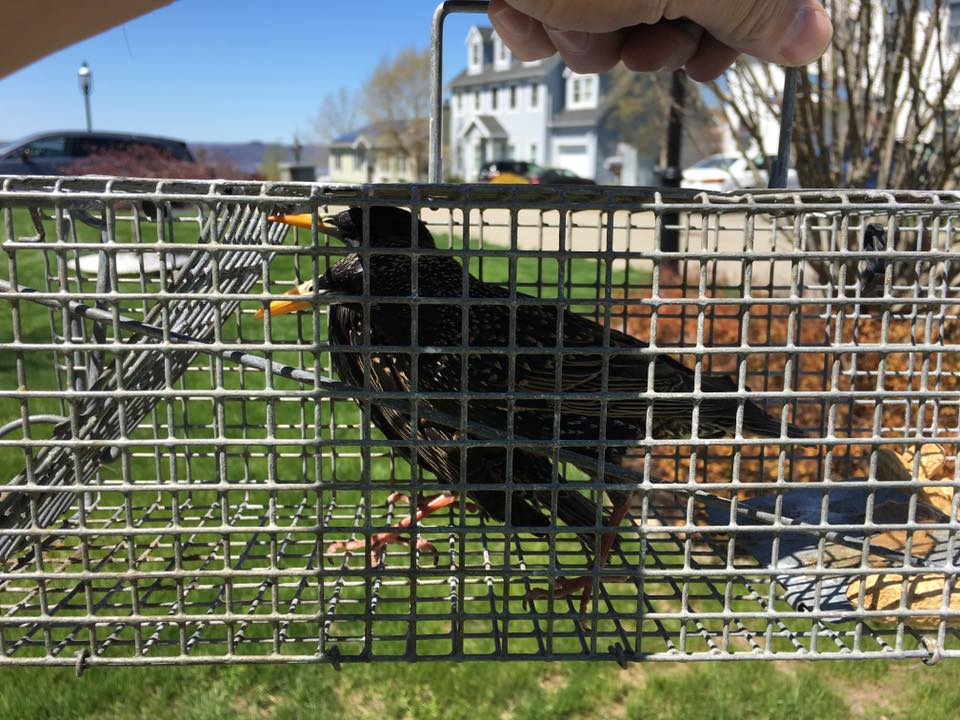
HOW TO REMOVE A BIRD NEST
There’s nothing quite like taking an early morning walk and hearing birdsong. Having a bird nested right outside your window, however, is likely to grow old quickly. That’s without considering the damage birds can do to your property. Nooks and crevices; vents, pipes, and chimneys; flowerpots and windowsills, you name it, birds will nest there.
Yet, if you’re thinking about just pulling the bird’s nest down, think again.
It can be illegal to remove a bird’s nest. According to the Migratory Bird Treaty Act of 1918, interfering with an active nest that belongs to a native species can give you a hefty fine. If, on the other hand, you’re dealing with an invasive species such as the house sparrow, there are no legal restrictions.
If you are not sure about which species you’re dealing with or where the law stands, contact your local authorities, such as Wildlife and Fisheries. They’ll be able to provide you with all the necessary details.
Alternately, to avoid getting on the wrong side of the law, please contact us here at Wildlife X Team New Hampshire. We’re familiar with all the legal and technical aspects of bird nest removal. Plus, we’ll advise on preventing nesting birds in the first place. But first, check out the following advice.
CHECK THAT THE NEST IS INACTIVE
If you’re confident the species you’re dealing with is native, then you won’t be able to do anything. Otherwise, if the nest has been abandoned, then you can proceed. Monitor the nest for at least a week, ensuring no bird returns, day or night.
If the nest is inhabited, don’t worry. Most migratory birds will leave by the end of the season. Even other species do not inhabit nests for prolonged periods. Whilst most birds nest once a year, several species can build four to five nests a year. Meaning they’ll be moving on in no time. Songbirds, for instance, usually stay around two to three weeks. Meanwhile, raptors can nest as long as eight to ten weeks.
LOOK FOR EGGS
Climb on a ladder and take a look. You’ll want to avoid the parents being around. If you do find eggs but seemingly no adult birds, don’t assume they’ve been abandoned. Eggs are viable for several weeks after being laid, and so, the parents may have simply vacated the nest for a short while.
If the bird you’re dealing with is non-native, you’ll be able to remove the nest eggs. However, make sure not to break the eggs in the process – that’s just more mess to clean up.
REMOVING THE NEST
After a nest has emptied – or you’re dealing with a non-native species – you’ll need to take the following steps:
- Grab a flashlight and ladder. Obviously, the ladder needs to be tall enough to reach the nest.
- Put on some protective gear: gloves, a mask, and goggles.
- Depending on the location, you may need to pry the nest loose. Use a dowel rod and needle-nose pliers to pull the nest out.
- Otherwise, pull the nest out and place it into a black plastic bin liner.
- Dispose of the nest.
- Clean away any debris and fix any damage.
PREVENT FURTHER NESTING
Lastly, you’ll want to stop further nesting in the future. Common helpful tips include:
- Installing a bird box; By doing so, you give birds in the area an alternative to nesting in your home. Ensure the bird box is big enough to accommodate the local species of bird.
- Remove the bird feeder or move further away from your property: Birds often build nests near their food sources – it’s like having a grocery store by your house. Therefore, moving the food source further away reduces nesting incentives.
- Place bird flight control spikes on your property: Commonly found in town centers, bird spikes prevent birds from standing or nesting.
- Apply bird repellent: Readily purchased online or in stores, bird repellent contains chemicals that dissuade birds from nesting.
If you want further advice or assistance, contact Wildlife X Team New Hampshire. We’re always ready and happy to help.
We service New Hampshire and the surrounding areas like:
Laconia, Meredith, Alton Bay, Alton, Ossipee, Center Harbor, Center Tuftonboro, Gilmanton, Gilmanton Iron Works, Holderness, Rumney, Lochmere, Loudon, Newfound Lake, Moultonborough, Gilford (Govt. Isl), Plymouth, Danbury, Hebron, Tilton, Winnisquam, Wolfeboro, Ashland, New Hampton, Bristol, Andover, Salisbury, Wolfeboro Falls, Belmont, Hill, Bridgewater, Grafton, New London, Sunapee, Wilmot, Holderness, Franklin, Squam Lake, Sanbornton, Lake Winnipesaukee, Sunapee Lake, and Silver Lake.
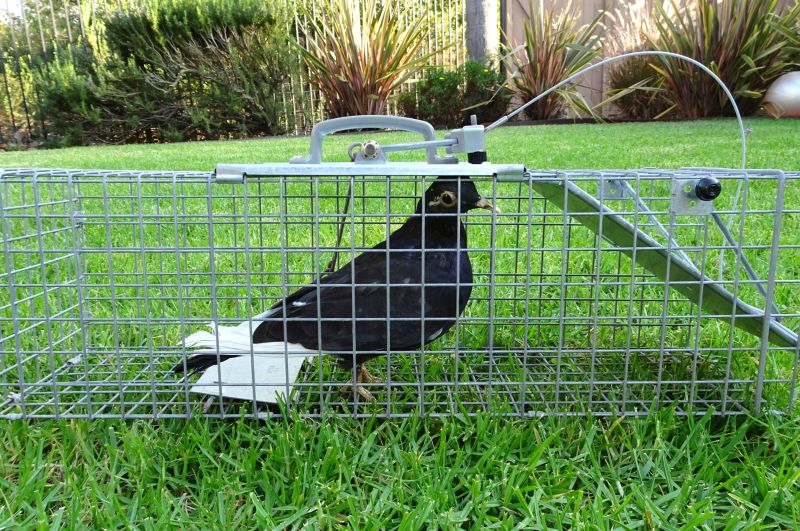
How to Get Pigeons out of a Wall
Of all of the nuisance bird species that exist, pigeons are likely the most annoying and damaging ones. Pigeons can be found across great swaths of the world, living in urban and rural areas alike. Pigeons spread disease and cause serious damage, so if they get into your home, it can present a serious problem. Continue reading to learn how to get pigeons out of your wall.
What attracts pigeons to a property?
When it comes to places where pigeons will enjoy living, there are a couple of factors that help them decide. One of the most important is the shelter that they can find. Pigeons are very fond of finding protected areas to roost out of the wind, rain, and prying eyes of predatory birds. This is especially the case when they are looking to raise their young. In addition, pigeons are also fond of finding easy access to food. This is why pigeons feel so comfortable around urban areas, where there are plenty of food scraps and garbage ripe for the picking.
What problems do pigeons cause?
Pigeons are a very destructive nuisance species, as they harm both humans and property. The risk that pigeons pose to humans is very serious, as they carry dozens of diseases at any given time. Some common diseases pigeons carry are histoplasmosis, cryptococcosis, and psittacosis, to name a few. These diseases are most commonly spread to humans when they come into contact with any pigeon droppings, or even their feathers in some cases. Pigeon droppings can carry the diseases long after they have dried, creating the potential for long term exposure to disease.
When it comes to property damage, most of this has to do with bird droppings. Pigeon droppings are highly corrosive, potentially causing rapid degradation and eventual collapse of structural metal. This can be a very expensive repair that could even harm people, especially in a place of business. In addition, pigeons often decide to build their nests in HVAC systems, which can eventually cause the flammable nests to light, possibly causing a fire.
How can pigeons be prevented?
There are many ways to prevent pigeons from getting into your walls, but this one tip can be the most effective of them all. To begin with, it is important to look all around your home, looking for any areas that could allow pigeons access into your home. If you see any problem areas, look into repairing them as best you can. Many times all-weather sealant, new lumber, new shingles, or aluminum sheeting will do the trick. Some problem areas may be too complicated to fix on your own, and in this case hiring a professional would be a wise decision.
How should pigeons be removed?
Pigeons in your walls can be a very difficult problem to solve. This is due to the fact that birds are able to fly very quickly and reach new parts of your home with ease. This makes removing them by hand virtually impossible. In addition, birds will often have their young inside of your walls, and if the mother is removed, these babies will die and smell terrible.
These reasons are why the best thing you can do to remove pigeons from your walls is to hire a professional wildlife removal company. The experts at these companies will be able to assess your unique situation and recommend a removal strategy that works for you. Beyond this, they can provide cleaning and sanitation services that will remove all traces of the diseases the birds spread. Finally, these companies offer prevention services to keep any future pigeon infestations from occurring.
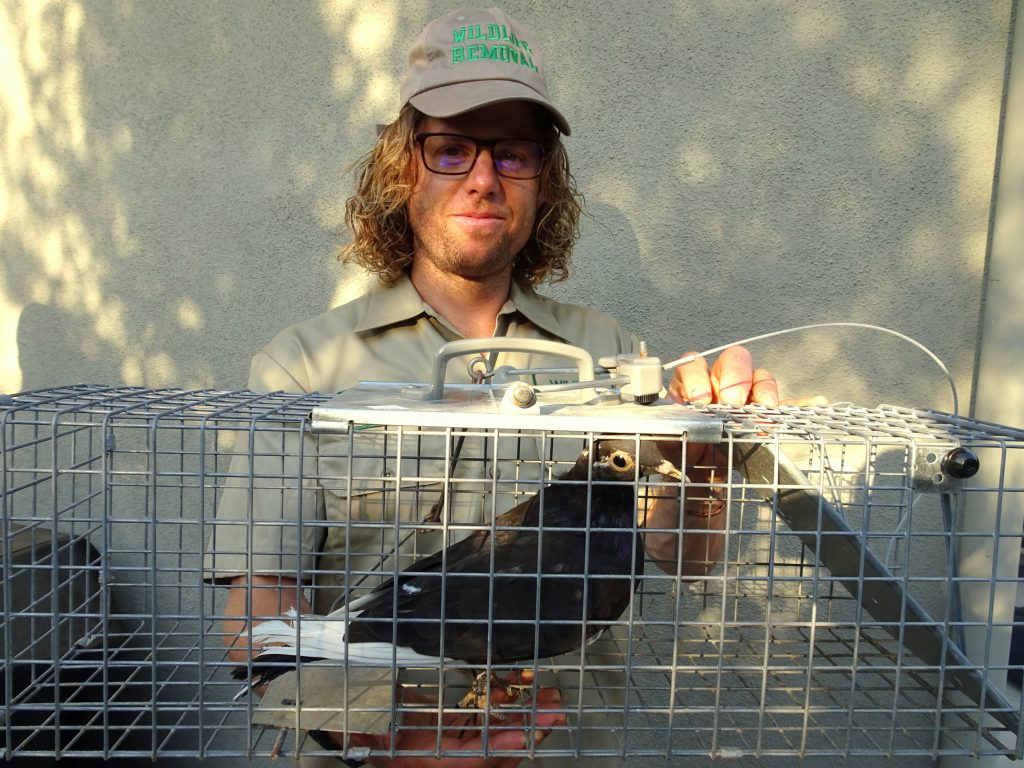
How to Keep Birds Out Of The Attic?
Birds soaring in the blue skies is a beautiful sight of nature. But when they invade your attic, that beauty transforms into horror. Although birds naturally build their nest on treetops, some nuisance species (like pigeons and starlings) have figured out the immense benefits of residing in the attic. Some include warmth, safety from predators, and proximity to food.
Unfortunately, birds in the attic can quickly become problematic. Their incessant chirping sounds are the primary source of the disturbance. Not to mention the massive amount of waste they leave behind. Asides from the awful odor of their droppings, its acidic content also leads to the deterioration of metal, wood, and other structures in the attic. Moreover, bird poop can potentially carry harmful diseases and parasites.
With all this, it only makes sense to prevent birds from becoming unwelcome visitors in your attic. This post explores how you can accomplish that!
Seal off the attic
Let’s face it; there’s no way birds can get into your attic if there is no entrance available. Hence, your first goal must ensure there’s no way for birds to get in. Thoroughly inspect your attic to look for potential entry holes like holes and cracks in the wall. Seal those holes with a wire mesh or even caulk. You can use a net or chicken wire for larger holes or openings. Ensure you use a tight net so smaller birds won’t be able to get through it.
Try to conduct inspections regularly to identify vulnerable stops promptly and take the necessary actions required.
Get rid of easy access to food on your property.
As noted earlier, birds love the attic because of the proximity to the food it provides. From leftovers in the garbage to outdoor pet food to fruits in the garden, birds can easily have their pick any time of the day. That’s why you must limit/eliminate access to easy food on your property. Some of the helpful tips to bear in mind include:
1) Do not leave pet food outside. You can feed your pets indoors instead of outdoors.
2) Cover your garbage cans adequately.
3) If bird feeders attract too many birds, consider moving the feeders farther away from your house. If that doesn’t solve the problem, remove the bird feeder for now.
4) Protect fruits and vegetables in the garden. Ensure you keep a clean garden by clearing fallen fruits and leaves from your garden. If possible, install a net over your garden.
Repellents
Several kinds of repellents can deter birds from nesting in your attic. Common examples include:
- Bird spikes
These pointy metal/plastic devices can be placed in areas frequented by birds (like rooftops) in your yard. The sharp edges prevent birds from landing in the future.
- Sound repellents
There are different types of sound repellents. A device as simple as a radio can help keep birds away as birds get the sense that humans are close by from the radio’s voice. In recent years, ultrasonic sound repellents have become prominent, but their effectiveness is still debatable.
- Decoys
Plastic decoys of predators (like owls) can also keep birds away from the attic. However, ensure you move the decoy from time to time so birds won’t acclimate to it.
- Bird gel
This bird repellent is a solution that emits ultraviolet light and the scent of peppermint, which combines to make birds uncomfortable. Gels are very effective because they can last for two to four years.
Get professional help
If nuisance birds have found their way into your attic and you’ve tried all you can to get rid of them to no avail, then it’s time to get a professional involved.
Get Quote for Your Exclusive Wildlife Inspection Report.®


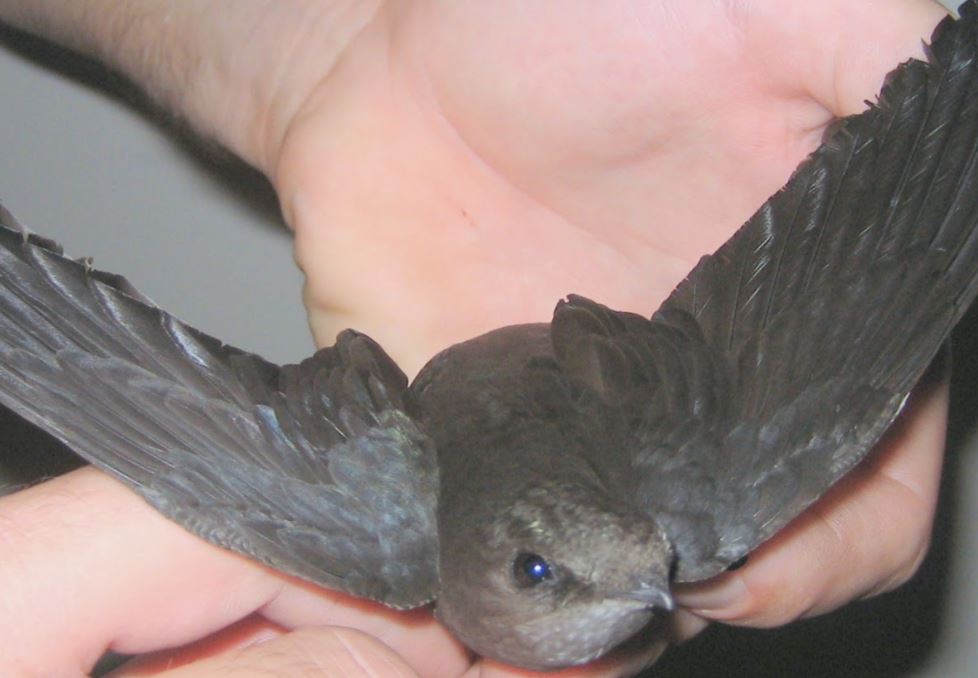
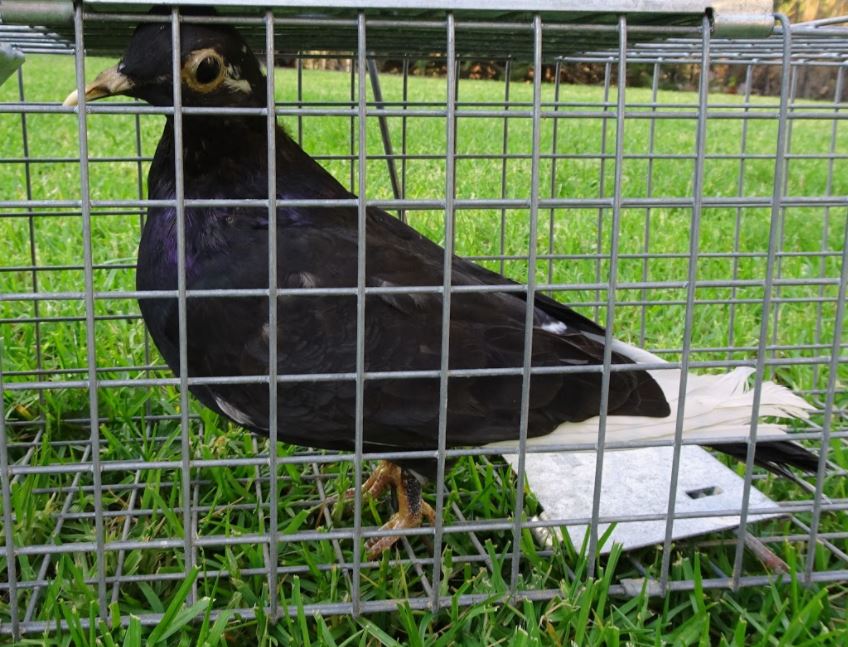
Call for Your Exclusive Wildlife Inspection Report.®


